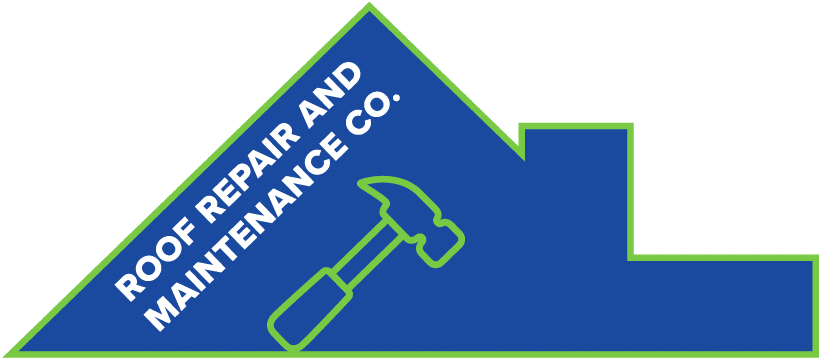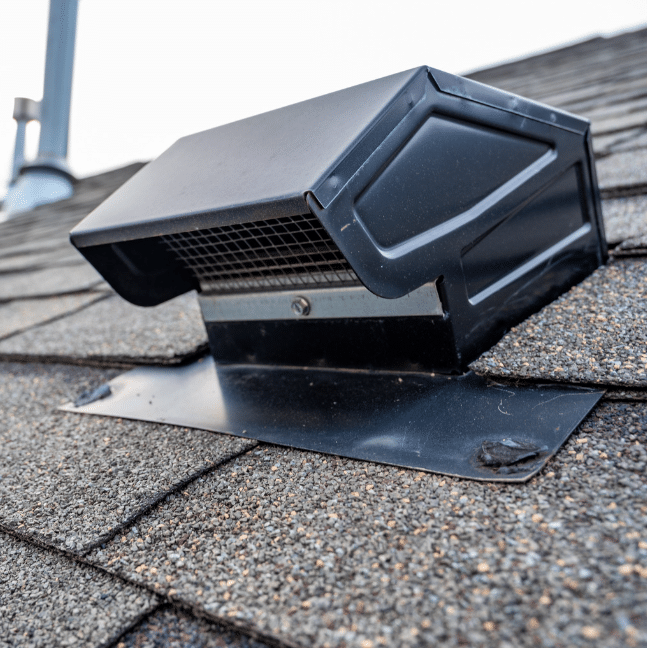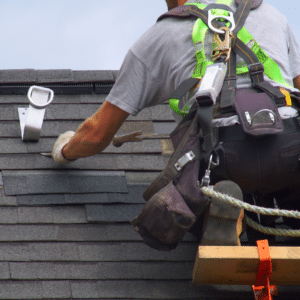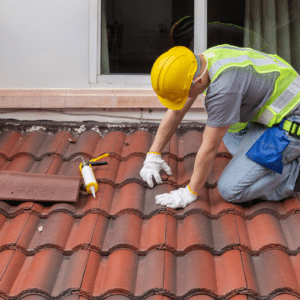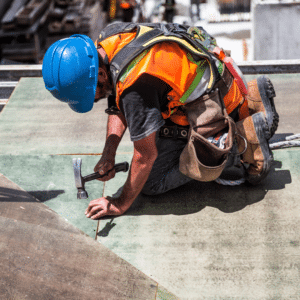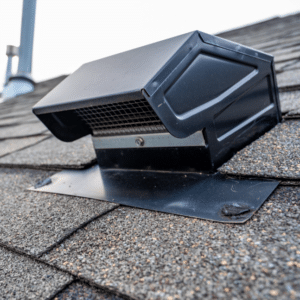Understanding proper roof ventilation in Denver CO for long-term roof health is essential to maintaining the integrity of your home or commercial property. This article offers clear, expert guidance on how proper roof ventilation in Denver CO works and why it is crucial for long-term roof health in Denver’s unique climate.
Proper roof ventilation in Denver CO is critical for preventing moisture buildup, regulating attic temperatures, and extending the lifespan of roofing materials. It involves intake vents that allow fresh air into the attic, exhaust vents to let hot, moist air escape, and balanced vent placement for optimal airflow. Roof ventilation systems must be designed to address Denver’s unique climate challenges, including snow, ice, and temperature fluctuations. Annual inspections and timely updates to your roof ventilation system can prevent costly repairs and protect your property.
Table of Contents
Key Takeaways:
- Proper roof ventilation in Denver CO prevents moisture buildup, reduces heat stress, and extends the life of roofing materials.
- A balanced system with intake and exhaust vents ensures optimal airflow and protects against weather-related damage.
- Effective ventilation reduces heating and cooling costs by maintaining stable attic temperatures.
- Roof ventilation systems must be designed to address Denver’s unique climate challenges, including snow, ice, and temperature fluctuations.
- Annual inspections and timely updates to your roof ventilation system can prevent costly repairs and protect your property.
Read on to discover detailed insights into each component of roof ventilation and practical tips on how to ensure your roofing system is properly equipped to handle Denver’s weather conditions.
Fundamentals of Proper Roof Ventilation in Denver CO
Roof ventilation might seem like a minor aspect of building design, but in Denver’s unique climate, it is a critical factor in maintaining the longevity and efficiency of your roofing system. Proper roof ventilation in Denver CO helps protect against challenges like scorching summer heat and freezing winter conditions by balancing attic temperature and humidity levels. This prevents issues such as moisture buildup, ice dams, and excessive heat retention, which can degrade roofing materials and lead to costly repairs. With US demand for roofing ventilation products projected to grow at a 3.4% annual pace, reaching $955 million by 2025, it’s clear that more property owners recognize the importance of investing in efficient roof ventilation to enhance energy efficiency and protect their roofs.
Key Benefits of Effective Roof Ventilation
Investing in proper roof ventilation in Denver CO is essential for maintaining the health and functionality of your roof while providing significant long-term benefits. In Denver’s challenging climate, an efficient ventilation system works to protect your property from seasonal temperature extremes and moisture-related damage. It also enhances energy efficiency, reduces repair costs, and ensures a comfortable, safe indoor environment for residents and tenants.
- Temperature Control: By allowing hot air to escape during Denver’s hot summers and minimizing ice dam formation in the winter, proper roof ventilation in Denver CO helps regulate indoor temperatures, reducing strain on heating and cooling systems and lowering energy bills.
- Moisture Management: Effective roof ventilation prevents the buildup of moisture in attic spaces, reducing the risk of mold, wood rot, and compromised structural integrity, ensuring long-term protection for your property.
Essential Components of a Roof Ventilation System
The effectiveness of a roof ventilation system in Denver CO relies on the seamless operation of its components, including intake and exhaust vents, to regulate temperature and humidity. Intake vents, located at the roof’s lowest edge, draw in fresh air, while exhaust vents expel hot, moist air at the peak, preventing heat buildup and moisture retention. Achieving a balance between these components is vital for protecting roofs from Denver’s unique climate challenges. As demand for intake vents grows faster than for exhaust vents—driven by new construction, which accounts for 75% of intake vent demand—investing in modern ventilation solutions ensures long-term performance and aligns with evolving market trends in proper roof ventilation in Denver CO.
Common Ventilation Challenges in Denver Homes
Even in well-designed buildings, roof ventilation systems can encounter problems, especially in Denver’s climate, where temperature fluctuations and seasonal weather extremes are common. Proper roof ventilation in Denver CO is vital to prevent issues caused by blocked airflow, insufficient ventilation, and excessive moisture. Without addressing these challenges, homeowners may face higher energy bills, structural damage, and costly repairs. Regular inspections and maintenance are essential to ensure your ventilation system operates efficiently.
- Blocked Vents: Snow, ice, or debris can obstruct vents, impeding airflow and reducing the effectiveness of roof ventilation in Denver CO. Blockages can cause heat buildup and moisture retention, leading to damage.
- Inadequate Ventilation: Insufficient ventilation often results in heat buildup during summer and excess moisture in winter, both of which are particularly problematic in Denver’s dynamic climate.
How to Assess and Improve Your Roof Ventilation
For property owners in Denver, evaluating and enhancing roof ventilation is crucial to maintaining a healthy, efficient roof system. Proper roof ventilation in Denver CO can be assessed through regular roof health reports conducted by experienced professionals. These inspections help identify blockages, inadequate airflow, or other potential problems that could compromise your roof’s performance. If issues are found, upgrading the system by installing additional vents or replacing inefficient components can significantly enhance air circulation. This process ensures that the ventilation system addresses Denver’s unique climate challenges, such as extreme temperature shifts and snow accumulation, helping to extend the lifespan of your roof and improve your property’s energy efficiency. Consulting with a roofing expert ensures long-term success.
Harnessing the Benefits of Proper Roof Ventilation in Denver CO
Proper roof ventilation in Denver CO for long-term roof health is more than just a requirement—it’s a strategic investment in your property’s performance and efficiency. Implementing effective ventilation strategies not only extends roof lifespan and enhances indoor air quality but also reduces energy costs. In fact, a study by the Florida Solar Energy Center found that proper attic ventilation can lower a home’s cooling energy consumption by 10%. This highlights the value of prioritizing roof ventilation as a means to improve comfort, operational efficiency, and sustainability for Denver property owners facing seasonal climate challenges.
Taking steps to ensure your roof is properly ventilated will protect your investment and enhance the comfort of your building’s occupants. Consider consulting with a roofing expert to analyze your current system and explore improvements tailored to the Denver climate. This proactive approach not only addresses immediate concerns but also positions your property for long-term success and sustainability.
Protect your investment with expert care from Roof Repair and Maintenance. Whether you need solutions for a residential roof or a commercial roof, ensuring proper ventilation is essential for long-term performance. Contact us today to book your free inspection and explore our comprehensive services tailored to Denver’s unique climate.
How does Denver’s high altitude affect roof ventilation needs?
Denver’s high altitude results in more intense sunlight and rapid temperature changes, which can cause roofs to heat up quickly and cool down just as fast. Proper roof ventilation helps manage these fluctuations by expelling excess heat and moisture, reducing stress on roofing materials, and maintaining a balanced indoor temperature.
Can improper roof ventilation lead to structural damage?
Yes, improper roof ventilation can lead to structural damage over time. Trapped moisture can cause wood to rot, weaken the roof’s structural integrity, and promote mold growth, while excessive heat can warp shingles and other materials, shortening their lifespan.
Is roof ventilation necessary for flat or low-slope roofs?
Yes, roof ventilation is just as important for flat or low-slope roofs as it is for pitched roofs. These types of roofs are prone to moisture buildup and heat retention, which can lead to issues like condensation, roof deck damage, and reduced energy efficiency. Proper ventilation helps mitigate these risks.
